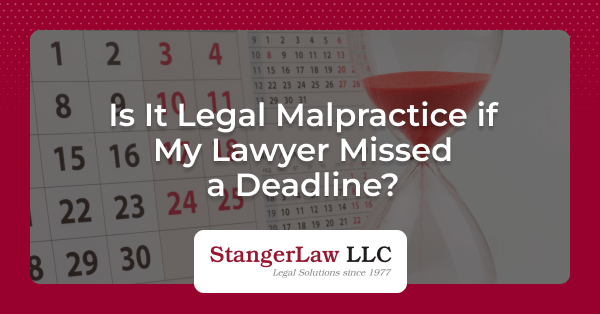Is It Legal Malpractice if My Lawyer Missed a Deadline?

As attorneys, we are held to a certain professional standard that helps us be advocates for our clients.
While many attorneys make mistakes, it’s our job to provide competent, knowledgeable service. If your lawyer missed a filing deadline, you’re probably wondering if it constitutes legal malpractice.
Here’s what you need to know about defining malpractice and how our Connecticut legal malpractice law firm can help if you sustain damages.
To request a consultation, please call (860) 561-0651 or send us an online message today.
Professional Conduct Rules
The State of Connecticut, like other jurisdictions, has rules of professional conduct that all attorneys must follow. Oddly, for a long time the courts did not allow these rules to be used to determine malpractice in a claim by a client.
These rules may determine the minimum legal knowledge required of a practicing lawyer and how they respond to time limits. Rule 1.3 states that a lawyer must “act with reasonable diligence and promptness in representing a client.”
So, what does this mean?
Based on the commentary provided in the rule book, legal malpractice may occur when a lawyer’s procrastination negatively impacts their client’s case.
However, a lawyer isn’t expected to pursue every realized advantage in a case. This means that while some deadlines are up to the discretion of the lawyer, others are too important to delay. Missing certain filing or paperwork deadlines not only hurts the client but may also sink the case altogether.
The ultimate determining factor may be if the client was materially damaged by the breach of a rule.
Ultimately, malpractice cases against lawyers are only about damage to the client. A civil malpractice claim is quite simply to get damages for the breach of a standard, whether that standard is stated in a Rule or simply established by what a reasonable lawyer should do.
It is not about punishing the lawyer that is what a grievance is for. Filing a grievance does not result in an award of damages but it can result in punishing the lawyer.
Which Missed Deadlines Are Legal Malpractice?

If your lawyer failed to file on time, it’s only worth bringing a claim if the legal malpractice affects your case.
So if an attorney skips a deadline for a filing that’s irrelevant to the case, it may not constitute malpractice.
However, if your lawyer missed a court deadline or missed a discovery deadline, there may be more serious consequences.
This unreasonable delay often causes problems for the case in the future. Such as a lack of evidence or case dismissal.
Another scenario where missing deadlines may not be legal malpractice is in the case of mutual postponement or state-ordered suspensions. In March 2020, Connecticut Governor Ned Lamont suspended time requirements for some court filings due to the COVID-19 pandemic.
This suspension lasted for the duration of the executive order, giving more time for certain types of cases. However, this doesn’t prevent your attorney from properly calendaring deadlines and important dates.
Is it Legal Malpractice If My Lawyer Missed The Statute of Limitations?
Perhaps one of the obvious examples of legal malpractice is failing to file before the statute of limitations. This is because it often destroys the client’s case, leaving them with no way to pursue their claim.
Damages
When a lawyer fails to meet the statute of limitations, they can be held accountable. Specifically for the damages that would have been awarded to the client if the case had been filed on time.
The damages in an underlying claim that you could recover from your attorney when they miss a statute of limitations deadline include:
- Damages for actual economic loss, such as medical expenses, lost wages, repair costs, property replacement, and lost earning capacity;
- Damages for your pain and suffering; and
- Punitive damages when the defendant in your underlying claim was intentional or wanton or recklessly indifferent to your rights.
Proving these damages isn’t always easy in a malpractice claim or in the underlying claim, so the assistance of counsel may be crucial to the success of your malpractice case.
Examples of Failing to Meet the Statute of Limitations
An attorney’s negligence regarding deadlines can come up in a variety of ways. An attorney might miss a filing deadline because they were not paying attention to the calendar. Or because they were focused on the wrong defendant or legal claim.
A knowledgeable attorney from StangerLaw LLC can pinpoint all the instances of attorney negligence in your case and help you obtain the best legal relief for your circumstances. Now, let’s go over some examples of potential malpractice based on a statute of limitations.
Example #1: The Wrong Defendant
Imagine an individual who becomes a personal injury victim because an 18-year-old drunk driver struck them from the side. That victim now has multiplying bills and has been unable to return to work. In this scenario, the victim’s attorney decides to sue the driver and reviews the evidence file. Part of the evidence that is available for the attorney’s review is a police report in which the driver stated that they were driving home from a bar on the night of the incident. The attorney uses this statement for nothing more than to help prove how drunk the driver was when they caused the accident.
Unfortunately, the driver is not independently wealthy and does not have enough coverage under their auto insurance policy to pay for all of the victim’s losses.
During negotiations, the victim and the attorney realize that they will only be able to get $50,000 from the driver, even though the victim’s hospital bills are close to six figures. The attorney then realizes that they could use Connecticut’s Dram Shop Act to sue the bar that served the driver drinks. Under the Dram Shop Act, a seller of alcohol who serves an intoxicated person who subsequently causes injury to another could be liable for up to $250,000. Unfortunately, a victim has only 120-180 days to give the seller notice and one year to sue an alcohol seller for the negligence of an intoxicated person. These deadlines have passed for the victim in this scenario, and this victim might have a claim for legal malpractice.
Example #2: The Wrong Legal Claim
When it comes to personal injury cases, different types of harm can have different statutes of limitations. For instance, a personal injury victim must initiate a product liability case within three years of suffering an injury.
However, if a victim has a personal injury claim, they may have only two years to sue. In certain circumstances, these can be extended. We can help you figure this out.
In light of the information above, think about a victim who suffered a severe injury to their legs because a negligent manufacturer’s machinery exploded while the victim was using it. The victim also developed a chronic cough at that time because of chemicals that were emitted from an improperly sealed component of the manufacturer’s machine. They describe the accident to their attorney, mentioning the severe injury to their legs and the funny way the air tasted and smelled after the explosion. They also mention in passing that they have had a stubborn cough since the accident and are wondering if the stress has been making them sick.
The attorney doesn’t think much about possible connections between the cough and the explosion and pursues damages under a product liability claim for the victim’s leg injury. This claim is filed within 2.5 years of the incident. While litigating the product liability claim, the victim sees a doctor on their own to investigate their cough and finds out it was likely the result of chemical exposure from the incident and will be costly to treat. However, it might be too late to sue on the exposure to the gas. This victim might have a malpractice claim against their attorney.
If your attorney missed a filing deadline regarding the statute of limitations, we recommend contacting our Connecticut legal malpractice attorneys immediately.
Did Your Lawyer Miss Case Deadlines? Call StangerLaw LLC
If your lawyer missed a filing deadline and isn’t taking reasonable steps to pursue your case, they should be held accountable.
At StangerLaw LLC, we take legal standards very seriously and believe you have the right to competent representation. We have decades of experience representing clients with attorneys mishandling their cases.
To discuss your potential legal malpractice claim, call us at (860) 561-0651 or contact us online.